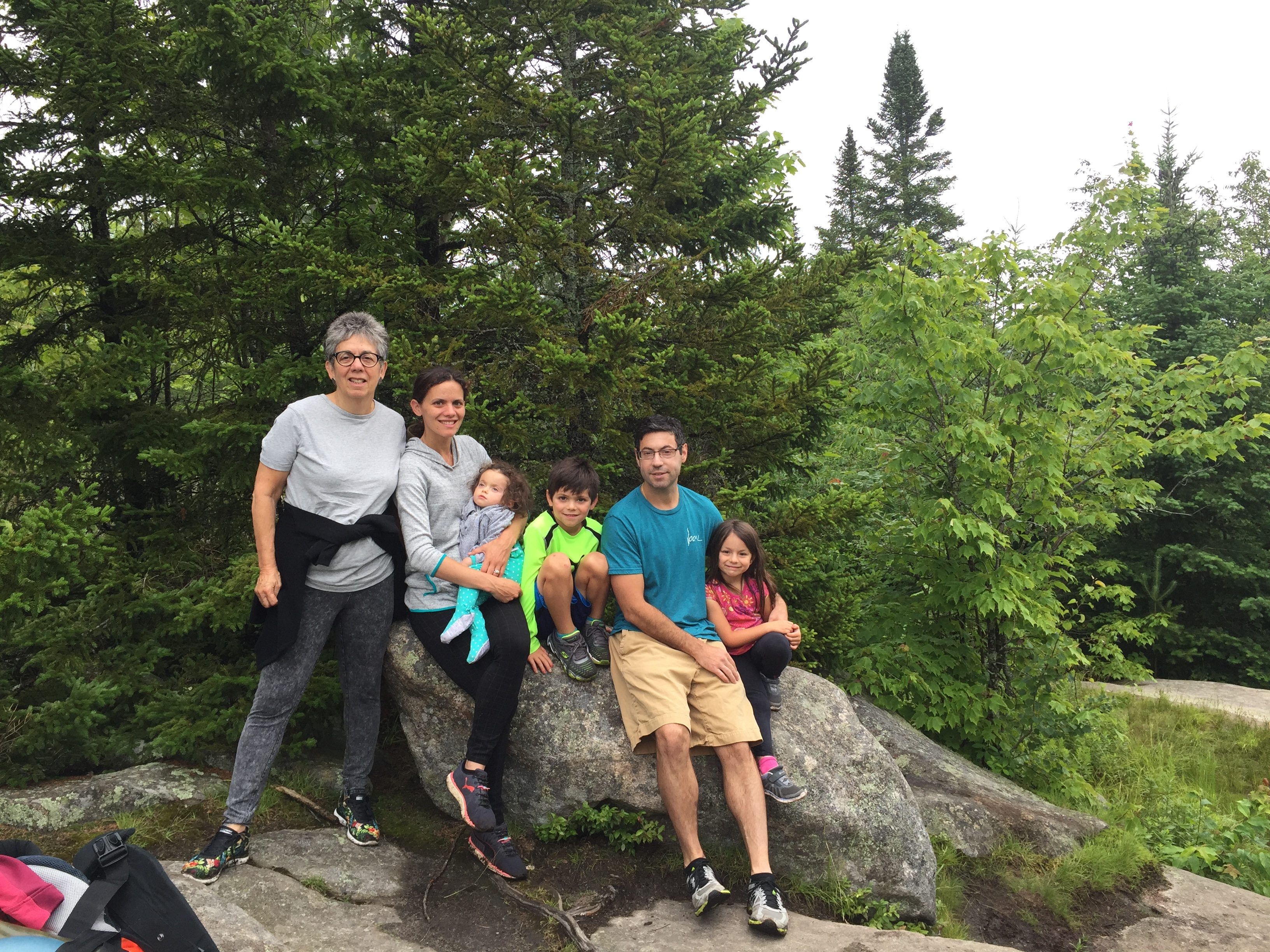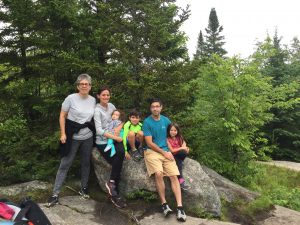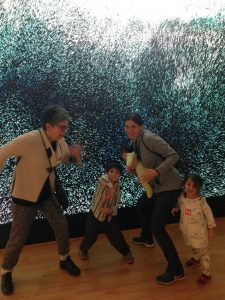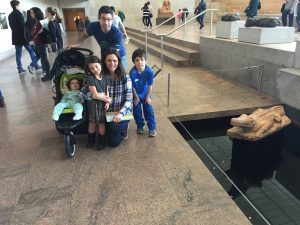9/7/2020
·Enable high contrast reading
Being a grandparent during the tough times

 I’m Carla Steckman’s mom and Talia Steckman’s grandmother.
I’m Carla Steckman’s mom and Talia Steckman’s grandmother.
In July, 2017, Talia died at 23 months from Tay Sachs disease, a neurological genetic disorder for which at that time there were no medical interventions.
Was I helpful to Carla and her family while Talia was sick? Or was I too scared or needy to be of much use as a grandparent?
Three years have passed, enough time to reflect on what I think I got right and what I learned.
What I did
For a year, from the week before time Talia was diagnosed until shortly after she died, I kept a journal. My way is with words; and though I know that’s not everyone’s way, I also encouraged my daughter to write down her thoughts, conversations, and impressions.
I’m pleased to say that Carla ignored this advice and kept no journal because she was too busy with Talia and her older two children; yet later, afterwards, she wrote her own book, an intimate portrait of sweet baby Talia with the beautiful smile who loved all words beginning with the letter B. Carla conveys the profound bond between herself and her child whom she carried in the womb and next to her, on her chest in a body sling, for almost two years. Both of us have a portrait of Talia’s life, including the happy moments when she was playing with her brother, sister and physical therapist or watching her siblings race around her while perched in her high chair.
Yes, my journal did record Talia’s downward progression, but it also was a sanctuary for the conflicting emotions which Talia provoked within me. For me, words seemed to be the only thing under my command during Talia’s freefall, and when I chose them and rearranged them, they soothed me and helped to order my thoughts.
After Talia died, I turned my journal notes into a book which is more journalistic less poetic than Carla’s as I chronicle the waning passage of time. Our mother/daughter conversations continued while we wrote separate volumes: this time about how to structure a scene or whether to shorten a section while recounting a family under stress.
While I present portions of my manuscript here, Missed: A Medical Moment, My Daughter’s Strength, and My Granddaughter’s Short Life, I am not in the least, suggesting that all grandparents become writers. What I’m suggesting is that grandparents try to find what they can share with their son or daughter that is pleasing to both of them. A visit, a thought, a text, a prayer, an article, a book, a photograph, an outing, a walk, a hike, a talk? Keep trying to find it and build upon what is found.
Prologue
Why write this sad story? Why risk opening a fresh wound? My granddaughter Talia lived only 23 months. While loving and caring for Talia, her family knows they will lose her.
My alternate tale of grandparenthood may be useful to anyone caring for an infant or child born with what are now referred to as life-limiting diseases. When I went searching the existing literature dealing with the gut and soul-wrenching conditions that became my new life, I didn’t find any helpful guides.
There is plenty written on telling the youngest generation that their grandparents are gravely ill and may die, but not the reverse: how can grandparents cope with two generations in crisis: their grown children, and a beloved, dying grandchild? My story is an out-of-the natural order of life saga. For the older generation, and even harder for the parents, the unspeakable becomes the reality.
I write to introduce you to my daughter Carla who comforted her youngest daughter, while improvising a path through the thicket and tragedy of terminal illness to help her older children, her husband, and the four grandparents survive the ordeal of watching Talia die from a rare genetic disease that could, and should, have been identified before Talia was conceived. It is a sad tale, but an inspiring one too, because I met a woman I hadn’t known: my own indomitable middle child.
Back to writing….a gratitude journal
Again, it’s not about keeping a journal or writing a book. What about expressing what you have to be grateful about, even while living through the tragedy?
Let’s come to the present day: I know that during these times of the coronavirus I’ve expressed my gratitude for being able to see my children and living grandchildren who live close enough to drive to. I’ve expressed gratitude for having friends whom I can email, who buoy me, and vice versa. I’ve expressed gratitude to my husband because I enjoy spending time with him (and he does the cooking).
During Talia’s lifetime, I read Jane Brody’s column in the New York Times, “Positive thinking may improve health and extend life.” She says to keep a “gratitude journal,” but I think that verbalizing gratitude is just as good.
In my book, I wrote:
- I’m grateful that Carla confides in me. We’re traveling together to Dallas with Talia in 2016 to the National Tay Sachs and Allied Disease Family Conference Talia because Carla wants me to come with them.
- I’m grateful that David can readjust his schedule to be with Nathan and Audrey when we went to Dallas to the NTSAD conference.
- I’m grateful that Carla was able to be present and joyful at her sister Ilana’s wedding.
- I’m grateful that David’s parents, Lally and Michael Steckman, are steadfast. Last week, the wedding week, they cared for Talia, and Carla called their care “the “spa experience”.
- I’m grateful, but not surprised, to learn that Carla told my friends at the wedding to support Larry and me.
What I got semi-right
I have another suggestion about sharing, though it may seem obvious. Talking together is sharing; conversations are sharing. Yet, because a child’s illness in the family is so difficult, it might be best for the grandparent to be more listener than talker. Listen hard. Talk less.
“On July 8th, about three weeks before they knew the diagnosis, I travelled from New York City to Albany to babysit Nathan and Audrey so Carla and David could take Talia for an appointment with a very well-regarded and experienced developmental pediatrician. When Carla returned, she rushed to the stove to put water up for tea. With her back to me, she said in a clear voice that I still hear: “The visit was not at all comforting.”
I was mute. How can I reassure her that Talia is okay if the doctor couldn’t? Silence hung between us. Finally I asked what he said. That was all I had to offer: my presence and an ear. It didn’t seem like much then. I think it turned out to be a lot.”
That’s my point. Show up. Offer your ear. Listen. Listen. Listen. Your son or daughter speaks; you listen: that’s your link to your child in distress. Offer your opinion when asked. I know that’s not easy.
I didn’t get it right. At the beginning, on my first visit after the diagnosis, I was so scared that I told Carla that I didn’t feel safe unless I was with her. She looked askance at me (not the first time) and said, “Mom, you can’t always be with me.” I learned quickly – she had just told me – that I couldn’t plant myself there or visit willy-nilly.
She was married, and enjoyed time alone with her husband and three children in as much and for as long as that was possible. On weekends when David was free from his 10-hour days at the hospital, she could spend time with him and the kids. She was a grown up. I was her mother.
She will be on her own with me in the background, I said to myself. She will have to make it through much of the thicket with her David. I could be her sidekick, available when called, able to visit, and always free to talk and text. But, not looming over them.
Oh, what a balance.
Be in the background.
But did I intervene?
Yes, I wanted to bring joy, or at least, distraction, into their household. I found a secret weapon: Pesto, the dog, the neurotic cockapoodle. I located him at a responsible breeder. He joined the family and it worked. I’m not saying getting a puppy is for everyone, but, oh, what a dog.
February 10th, the delivery day arrives, and that morning, Pesto runs duly delighted and wagging his tail into their lives. Carla videos the first moments. Audrey says in her most appealing upper register voice, “Pesto, Pesto, you’re home, puppy. You’re home.”
Talia, who is in her bouncy chair at floor level, has a ten-week-old puppy jumping over her feet and running circles around her. She cannot react. At seventeen months she is no longer focusing, reaching out, or, possibly, even seeing. She never reacts to Pesto unless he is nibbling on her toes. Her inability to relate to him reinforces the gravity of her illness.
But it was not too late for the rest of Talia’s family who find Pesto to be the right degree of edginess and insanity as he races through the dining room and living room, slipped, peed on the wooden floor, learned the perimeters of the yard, wagged his tail, grows fluffier by the day, and licks faces and hands, including Talia’s.
At 7:20 a.m., the day after Pesto arrives, Carla phones. An early morning call alarms me, but she says without being asked that everything is okay, “I just want to tell you about Pesto.” She gushes on about how cute the dog is as he played outdoors on a stormy day. He bounded off the porch into snow that was higher than he was and then crawled onto Audrey for relief. He took a second “dive” into the snow and then beat it back to their glass door. Then he stood there, his way of saying, “Let me in.” Meanwhile the kids learned the meaning of yellow snow: Pesto’s pee.
Carla’s voice is full of glee. She is giddy and I am happy, vindicated. If I did one thing right last year, it was chasing down their dog. When the phone call ends, Larry says, “I think I’ll drive up there next weekend to meet Pesto!”
That pup has power.
What I learned
I didn’t know how my soft-hearted daughter could survive her own daughter’s death. I thought somehow I’d lose her too. We had had such good communication. Would we be friends at the end? What would she be like?
The greatest surprise – what I learned – is that my daughter is soft-looking but steely. She made a vow to help Talia die well and she fulfilled it, while I watched. She is now on the NTSAD board.
So I say to all the grandparents that I hope they can find the right balance, the right way to be there. An ill child turns the world upside down and I wish each of you the very best of luck in tough times.
At the funeral Carla turned to me and said, “I hope I never need your help again.” To me that means, I was there and I did help.
CPN offers grandparents this guide for interacting with your adult children as they parent a child with a life-limiting condition. Watch other grandparents and family members in our video library for extended family and listen to this podcast about the special relationship between grandfather and grandson.




